- Articles ›
- Marketing and Strategy ›
- What's This App - Whatsapp Success Story! Articles
What's This App - Whatsapp Success Story!
The Article written by Aarti Khatwani from NMIMS is the Second Prize winner of the May 2012 Article Writing Contest
Percy Bysshe Shelley, in a romantic poem ‘To-‘, has written, “The desire of the moth for the star, of the night for the morrow. The devotion to something afar, from the sphere of our sorrow?”
These quotes is relevant, not in terms of romance, but in terms of staying connected to the people far away from our sight yet close enough to talk to, in this article.

Way back in 1876, a revolution was created by a 29year old genius – Alexander Graham Bell, in the form of a telephone. Sadly though, both, his mother and his wife were deaf.
Most of us alive today, weren’t then. But we did get to witness a similar break-through though, in 2009– WhatsApp, a dream come true of talking to a friend sitting oceans apart through radio-waves, meaning absolutely free! What used to cost a somewhere between Rs. 5-15 per message was brought down to being free by online messaging like Way2SMS.
This was still found to be cumbersome by people mainly due the involvement of internet which required logging or signing in a personal computer or laptop. This is where WhatsApp walked in to make life easy for smartphone users. It leveraged on the increasing popularity of the term, ‘Stay Connected’. Where people wanted staying in touch with their friends and loved ones for as low a price as possible, WhatsApp removed the price aspect from it. It seems this application builders leveraged on the growing population of ‘Short message service (SMS)’ users .e.g. image below.
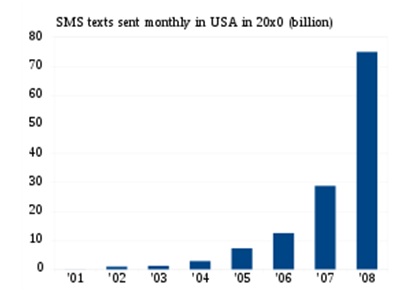
And in came the drastic change:
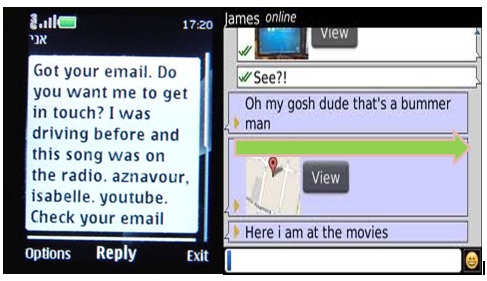
Present
An invention by ‘two guys with an experience of 20 years at Yahoo! Inc.’ as per the official website, WhatsApp stirred hard the broth BlackBerry (BB) had tried to, but could only cater to BlackBerry users, in the form of BB Messenger. No wonder, the success of WhatsApp is much greater (in terms of number of users) compared to BlackBerry Messenger. It is supported by many platforms – Windows, BlackBerry, Android etc. It has even managed to enter the territory of Apple, which is otherwise difficult to cross for a non-Apple-made application.
From being a multi-purpose, user-friendly, connectivity application to allowing sharing of not only messages but also images, audio files and videos, WhatsApp is a rage. The reason is pretty obvious – From downloading it to using it, WhatsApp is free!
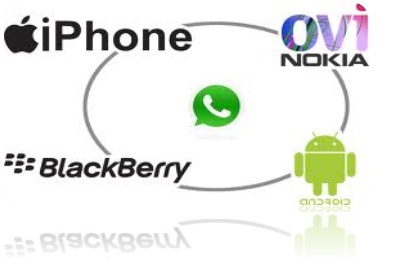
But then WhatsApp does cost you something. It demands an internet connection, on the smartphone handset, to be in use. Just out of curiosity, I wonder then why should one not be as crazy about using G-talk or Yahoo messenger or AOL as well. Some of us must have heard of the ‘kik’ application which followed in the footsteps of WhatsApp and was a declared success. Why, all of these are free too, with the internet connection? That makes them as well equipped as WhatsApp.
What, then, distinguishes WhatsApp from the other free of cost applications? It may be any one of the following –
1. The boom of 3G services followed by a fad for the same.
2. The plethora of cool and funky emoticons offered by WhatsApp.
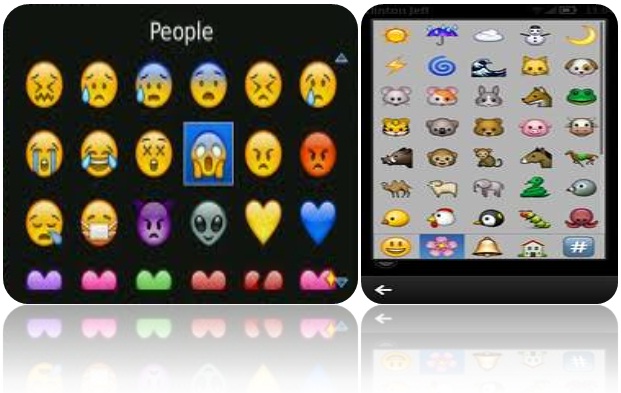
3. Adding a friend on WhatsApp is simple. Anyone who possesses this application on his/her smartphone and is present in your contact list at the same time is connected to you via WhatsApp.
4. WhatsApp doesn’t require any ‘Sign-in’ or ‘Log out’.
5. ‘What’s up’, the on-going homonym pun, somehow makes it easier for the youth to connect with WhatsApp (Intelligent naming).
6. WhatsApp connects with its users in more than one ways – Facebook, Blog and Twitter, riding on the success of social networking’s popularity.
There can be a lot more than these. For some, it’s the ease of clicking the WhatsApp icon, going to the chat with a friend and seeing when was the last time he/she was seen online on the app. For others, it’s the cool way in which one can update his/her status without really bothering everyone on his/her friend list to become aware of the same by a pop-up in their respective profile ( A friend’s status can be known only by going to ‘View profile’).
The telecom industry did not take long to realize that ‘Conference call’ was a much needed value added service. Hence,accepting the customer demands, WhatsApp too added a fascinating feature of ‘Group Chat’ in Feb 2011. Not only is it easy to create a group on WhatsApp, it is equally easy to quit the group too.
WhatsApp has constantly been adding more and more handsets to its kitty over the time and informing users of the same through its website and blog.
But fame is a double-edged sword. And so it happens that there has been a rumour taking some rounds; recently there was a hoax about WhatsApp charging a fee for its usage to the users whose screen logo did not turn red.
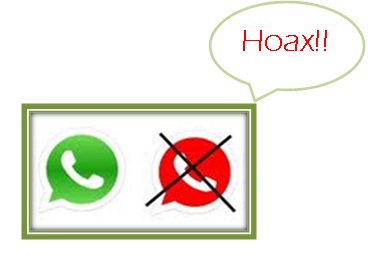
It was on declared on WhatsApp’s blog and everywhere else on the internet that the apparently alarming message was a fake one.Whether this was a marketing gimmick by the parent company or an attempt to kill competition by someone else is for the users to figure out.
Future
What lies ahead is known by none. The application is free today but may not be tomorrow or so the talks go around.
As far as the facilities provided are concerned, WhatsApp today does not provide the option of ‘Calling’ (although its logo has a phone receiver inscribed in the centre!). It may have this in future. With the technology growing in leaps and bounds, we may also expect a Skype-like free video call via WhatsApp. What has been a user-friendly, connectivity application till date may take a turn towards shared-information holding platform like Dropbox, meaning people may not only be able to chat on WhatsApp but also share and store common data. With the advent of ‘Cloud Computing’, the world has virtually shrunk down to the size of a room. It may not come as a surprise hence, to see such a large network-sharing support on WhatsApp someday.
Whether the mole will actually become a mountain someday is a mystery. Till then, we enjoy the present and await the surprises of future.
This article has been authored by Aarti Khatwani from NMIMS.
Views expressed in the article are personal. The articles are for educational & academic purpose only, and have been uploaded by the MBA Skool Team.
If you are interested in writing articles for us, Submit Here
Share this Page on:
What is MBA Skool?About Us
MBA Skool is a Knowledge Resource for Management Students, Aspirants & Professionals.
Business Courses
Quizzes & Skills
Quizzes test your expertise in business and Skill tests evaluate your management traits
All Business Sections
Write for Us